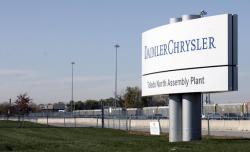Tim:
On the subject of un-American unions, I was talking relatively recently to a German progressive politician about the way that T-Mobile (a subsidiary of Deutsche Telekom) and the U.S.-based factories of German auto companies all use nonunion labor, undercutting labor rights at unionized rivals such as AT&T and the traditional big-three American automakers. I had assumed this kind of thing was a matter of conscious indifference in European political circles, but she seemed fairly surprised. So perhaps there is a route to reinvigorating labor through international solidarity. (I seem to recall something about having nothing to lose but chains.)
Now on the other hand, when people think about international issues and the impact on wages and inequality, what probably springs to mind is not Germany, but China. For a long time, the smart set’s view was that it was a myth that international trade depressed wages. But as you detail in the book, cutting-edge thinkers have changed their minds on this. Or, rather, they say the world has changed. Until the mid-90s, such an overwhelming share of world trade happened between rich countries that events in poor ones didn’t really matter. But now China and others own such a rapidly growing share of the global economy that American wages really are being dragged down by competition with third-world wages. I’ve heard this referred to as “factor price equalization”—eventually low-skilled workers everywhere on Earth will earn the same amount, meaning Chinese wages rise and American wages fall.
From an ethical perspective, this may be the trickiest part of the picture. After all, there’s a good case to be made that this kind of transfer of wealth from American workers to Chinese workers is reducing inequality on a global scale. Obviously nobody’s going to run for office on a “the Chinese need those factory jobs more than you do” platform, but there are several grains of truth in it nonetheless. To me this bolsters the case for progressive taxation in order to finance more transfer payments and more and better public services, but I think most people don’t want higher transfer payments—they want safe, high-paying jobs.
Matt
